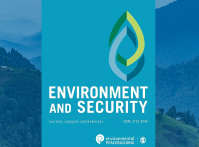-
Michael Kugelman on Pakistan’s “Nightmare” Water Scenario
May 26, 2017 By Benjamin Dills “Water scarcity is a nightmare scenario that is all too real and all but inevitable in Pakistan,” says Michael Kugelman, deputy director of the Wilson Center’s Asia Program, in this week’s podcast.
“Water scarcity is a nightmare scenario that is all too real and all but inevitable in Pakistan,” says Michael Kugelman, deputy director of the Wilson Center’s Asia Program, in this week’s podcast.“Water scarcity is a nightmare scenario that is all too real and all but inevitable in Pakistan,” says Michael Kugelman, deputy director of the Wilson Center’s Asia Program, in this week’s podcast.
Pakistan faces the intersecting challenges of population growth, inefficient infrastructure and policies, deep societal inequality, and climate change, leading to a situation where the country is “voraciously consuming water even as water tables are plummeting precipitously,” says Kugelman. Not only are water problems exacerbating internal tensions, they’re complicating relations with fellow riparian and upstream rival, India.
The degree of Pakistan’s dilemma is profound. A 2015 International Monetary Fund report found that Pakistan’s water consumption is the fourth highest in the world and its water intensity rate (the amount of water needed for every unit of GDP) is also among the highest. Groundwater reserves, the “last resort of water security,” says Kugelman, is a “safety net that is fraying.” He cites a NASA study that found the Indus Basin aquifer, shared between India and Pakistan, is the second most overdrawn in the world.
High levels of consumption are driven by the “robust demand of a rapidly growing population, which now numbers close to 200 million people,” says Kugelman. The annual growth rate is around 1.8 percent, and is projected to stay above 1 percent until at least 2030.
Poor infrastructure and policy also contribute to the dilemma. “Pakistan is unfortunately rather notorious for its leaky, dilapidated pipes, canals, and dams,” says Kugelman, which in turn supply a huge agricultural sector that guzzles water at an enormous rate. The government subsidizes water-intensive crops, like sugar, while encouraging inefficient irrigation methods, like flood irrigation. Overall, agriculture may account for 90 percent of Pakistan’s water usage, says Kugelman.
“It is 100% wrong to claim that water is a ‘soft’ issue, that the two sides can use water as a confidence building measure”In “feudal-like conditions” of deep inequality, tenants struggle to access water on land controlled by elites, who face little scrutiny in how they use it. “It’s been said that land ownership is as a proxy for water rights,” says Kugelman. “If you don’t own land, your right to water is highly tenuous.”
While these factors drive up demand, climate change is imperiling supply. The glaciers of the Western Himalayas, the headwaters of the Indus River and its tributaries, have been melting rapidly. “The government in Pakistan has claimed that glacial melt on Pakistan’s mountains has increased by nearly 25 percent in recent years,” says Kugelman. “The once mighty Indus River has slowed to essentially a trickle in parts of the southern province of Sindh.”
Many in Pakistan, including anti-India terror groups, see these problems and accuse India of hoarding water and depleting rivers that flow across the border. Some believe the only solution is to “liberate” the disputed border areas of Jammu and Kashmir.
But Kugelman says there is no evidence to support this accusation and that India is “more of a convenient scapegoat than a genuine explanation.” India has mostly built “run of the river” dams that do not store appreciable amounts of water and thus do not keep water from flowing across the border, he says. The Indus Waters Treaty also gives Pakistan the rights to the three largest rivers of the basin, amounting to 80 percent of flows, says Kugelman. “The broader reality is that there has actually been a fair level of cooperation between these two enemies in managing transboundary water resources in the Indus Basin.”
Climate change and rapid population growth are changing conditions significantly and there have been calls on both sides for the treaty to be renegotiated, but Kugelman believes there is not enough trust between the two for a renegotiation to be productive at the moment. “It is 100 percent wrong to claim that water is a ‘soft’ issue, that the two sides can use water as a confidence building measure,” he asserts.
Resolution of Pakistan’s water problems will require mainly domestic changes, but in the public eye are more connected with cross-border, nationalist contentions, a dynamic that only entrenches problems. “You cannot separate transboundary water management from the ugly, complex, political disputes in India-Pakistan relations,” he says. “There is really nothing apolitical about transboundary water management on the Indian Subcontinent.”
Michael Kugelman spoke at the Wilson Center on May 9, 2017.
Friday Podcasts are also available for download on iTunes and Google Podcasts.
Sources: International Monetary Fund, National Aeronautics and Space Administration.
Topics: adaptation, agriculture, climate change, conflict, consumption, cooperation, demography, development, economics, environment, environmental peacemaking, environmental security, extreme weather, flooding, food security, foreign policy, Friday Podcasts, hydropower, India, international environmental governance, natural resources, Pakistan, population, security, South Asia, water
 A Publication of the Stimson Center.
A Publication of the Stimson Center.

 “Water scarcity is a nightmare scenario that is all too real and all but inevitable in Pakistan,” says Michael Kugelman, deputy director of the Wilson Center’s Asia Program, in this week’s podcast.
“Water scarcity is a nightmare scenario that is all too real and all but inevitable in Pakistan,” says Michael Kugelman, deputy director of the Wilson Center’s Asia Program, in this week’s podcast.





